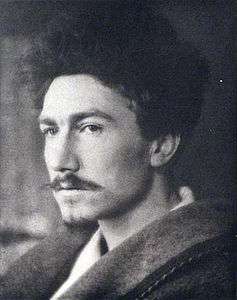Ballad of the Goodly Fere
The Ballad of the Goodly Fere is a poem by Ezra Pound, first published in 1909. The narrator is Simon Zelotes, speaking after the Crucifixion about his memories of Jesus (the "goodly fere"—Old English for "companion"—of the title).
Pound wrote the poem as a direct response to what he considered inappropriately effeminate portrayals of Jesus, comparing Jesus—a "man o' men"—to "capon priest(s)";[1] he subsequently told T.P.'s Weekly that he had "been made very angry by a certain sort of cheap irreverence".[2]
Critical response
Charles Elkin Mathews expressed his concerns that readers would find Fere's humanization of Jesus offensive.[3]
Edward Marsh sought permission to reprint Fere, which Pound denied because he wished to reprint it himself.[2]
T. S. Eliot said that Fere showed Pound's "great knowledge of the ballad form".[4]
William Butler Yeats said that Fere "will last".[5]
Ambrose Bierce is said to "consistently disapproved" the poems of a "young poet", until one came to him which impressed him so much he wore "out the paper and the patience of [his] friends by reading it at [sic] them", namely Fere. [6]
References
- ↑ The Last Temptation Reconsidered by Carol Iannone, from First Things 60, February 1996
- 1 2 A Guide to Ezra Pound's Personae: 1926 by K. K. Ruthven, University of California Press, 1969]
- ↑ Ezra Pound: poet. A Portrait of the Man & His Work. Volume 1: The young genius, 1885-1920, by Anthony David Moody, Oxford University Press, 2007
- ↑ Ezra Pound: His Metric and Poetry by T. S. Eliot, (New York: Alfred Knopf, 1917)
- ↑ The Work of Ezra Pound by Carl Sandburg, originally published in Poetry, February 1916
- ↑ The Poetry of Ambrose Bierce by Jack Matthews, originally published in slightly different form in the Ohio Review, fall 1997
External links
- Text of the poem, at poets.org
